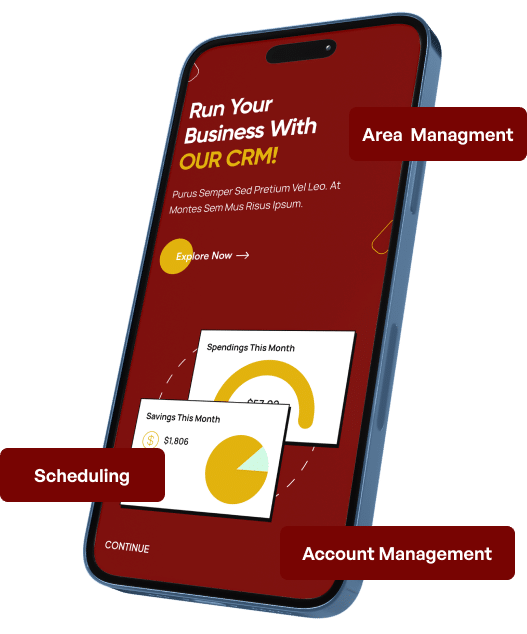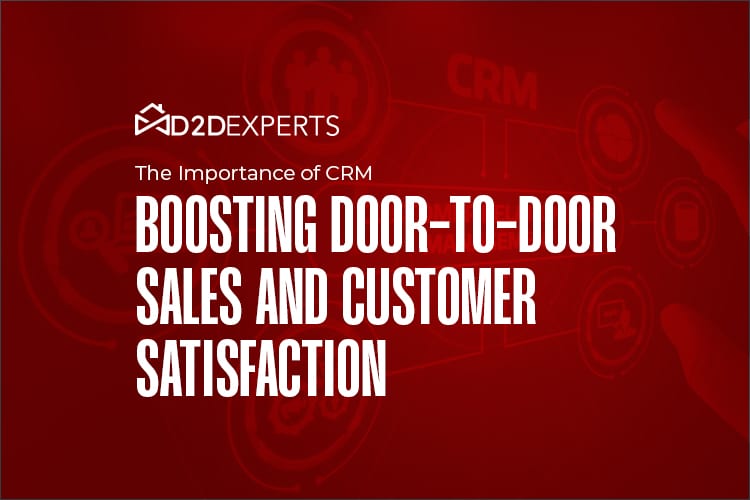Door to Door is a dynamic, fast-paced environment where building trust and personal connections can make or break a sale. Whether offering home security systems, solar panels, or pest control services, your success hinges on understanding your prospects, managing follow-ups, and delivering personalized value.
But how do you juggle hundreds, or even thousands, of door-to-door interactions while staying organized and ensuring no potential customer falls through the cracks?
Boost Your Door-to-Door Sales!
Streamline Your Process with the Free D2D CRM.

This is where a Customer Relationship Management (CRM) system becomes indispensable.
CRMs aren’t just for online sales teams or corporate offices; they’re game-changers for door-to-door professionals. They help streamline your sales process, track your interactions, and improve efficiency while enabling you to focus on what you do best: closing deals at the door.
Let’s explore the importance of CRM systems and how they can significantly boost your results in door to door sales.
1. Organizing and Tracking Leads Effectively
In door-to-door sales, leads are spread across neighborhoods and territories. Without an organized system, keeping track of each prospect, where you’ve been, and what stage each lead is in can quickly become overwhelming. This is where a CRM tailored to door-to-door sales shines.
With CRM, you can systematically manage your leads. Each visit, interaction, and follow-up note is logged and easily accessible. This eliminates the need for sticky notes or paper records, allowing you to see who needs a follow-up, which prospects are close to conversion, and where your team is focusing efforts.
For example, if you’ve visited a neighborhood and spoken to several homeowners, your CRM will allow you to categorize them into stages—interested, follow-up needed, or not interested. This level of organization prevents you from wasting time knocking on the wrong doors and ensures you’re focusing on prospects most likely to convert.
2. Improving Follow-Up and Closing Rates
Follow-up is crucial in door-to-door sales. While face-to-face interactions are powerful, it often takes multiple touchpoints before a prospect commits. CRM enables you to manage these follow-ups seamlessly, ensuring every potential customer receives the attention they need.
With a CRM system, you can set automated reminders to revisit a lead or follow up with an email or phone call at the right time. This consistency keeps you at the top of your mind and demonstrates your reliability and professionalism.
Additionally, CRM systems allow you to personalize your follow-up communications. Based on your initial conversations, you can tailor your message to address the prospect’s needs or concerns. This personalized approach significantly increases your chances of closing deals, showing that you remember the prospect’s situation and are committed to providing a solution.
3. Maximizing Time and Efficiency
Time is your most valuable resource in door-to-door sales. The more houses you knock on, the more sales opportunities you create. But without a structured approach, you could be wasting time on cold leads or inefficiently managing your routes.
CRM systems can help you optimize your time by mapping out your territories and helping you plan efficient routes. You can see which doors have already been knocked on, which ones need revisiting, and where new opportunities lie. This ensures you cover your areas comprehensively without redundancy or missed opportunities.
Additionally, CRM automates many of the administrative tasks that slow you down. No more manually tracking interactions or trying to remember which homeowner asked for a follow-up in two weeks. The CRM handles this for you, allowing you to focus on what matters—selling.
Check out our door-knocking app—a free app for door-to-door sales teams. It helps you manage leads, track customer interactions, and close more deals, all while on the go.
4. Enhancing Team Collaboration and Accountability
Communication and accountability are key if you’re part of a larger door-to-door sales team. Without a CRM, it’s easy for teams to overlap territories, miss leads, or fail to follow up properly. CRM systems provide transparency across your entire team, ensuring everyone is on the same page.
Each team member can log their interactions, update the status of leads, and see which areas have already been covered. This level of visibility reduces inefficiencies and eliminates duplicate efforts. Additionally, managers can use CRM to track performance metrics, ensuring that every team member is hitting their targets and working the leads effectively.
CRM fosters accountability for door-to-door teams. With a clear record of each rep’s activity, managers can identify top performers and those needing extra training or support. This data-driven approach leads to more effective teams and better overall results.
5. Building Long-Term Relationships for Repeat Sales
Door-to-door sales aren’t just about making a one-time sale—they’re about building long-term relationships that lead to repeat business and referrals. A well-implemented CRM system allows you to nurture these relationships over time, ensuring that your customers continue to see value in your products or services.
For example, if you’re selling pest control services, you’ll likely revisit homes for seasonal treatments or check-ups. CRM helps you keep track of each customer’s service history, preferences, and any concerns they may have raised in the past. When it’s time for the next treatment, you can approach them with a personalized offer or reminder, strengthening the relationship.
Moreover, happy customers are your best source of referrals. CRM helps you track which customers have provided referrals and enables you to follow up with them to express gratitude or offer incentives for additional referrals. This keeps the relationship positive and encourages word-of-mouth growth for your business.
6. Leveraging Data for Better Decision-Making
One of the biggest advantages of using a CRM system in door-to-door sales is access to data. Instead of guessing which territories are performing well or which tactics are working best, CRM provides real-time data that helps you make informed decisions.
You can track metrics such as lead conversion rates, follow-up success rates, and territory performance. This data allows you to see which approaches yield the best results and where you may need to adjust your strategy. For example, if one neighborhood has a high conversion rate, you may allocate more resources or replicate that success in similar areas.
Additionally, CRM systems can help you forecast future sales based on historical data. This allows you to set realistic goals and allocate your time and resources accordingly, ensuring your efforts always focus on the highest-impact opportunities.
7. Increasing Customer Satisfaction and Trust
Trust is everything in door to door sales. Homeowners need to feel confident that they’re making the right decision when they invite you into their homes. CRM systems help you maintain a professional and consistent approach, which goes a long way in building trust.
With CRM, you can remember small details from previous interactions, such as a customer’s preferences or concerns. This makes your follow-ups more personal and demonstrates that you’re attentive to their needs. Customers’ trust in your brand and offerings grows when they feel you truly understand them.
Additionally, CRM helps you maintain high service standards by ensuring no lead or customer is neglected. Whether it’s a follow-up after a service or a check-in to ensure satisfaction, CRM keeps you on top of customer care, enhancing their experience and increasing the likelihood of repeat business.
Boost Your Door-to-Door Sales!
Streamline Your Process with the Free D2D CRM.

CRM is the Key to Door-to-Door Sales Success
From organizing your territories and maximizing your time to fostering long-term relationships and leveraging data for better decision-making, CRM is the secret weapon that can take your door-to-door sales to the next level. With specialized tools like the free door-knocking app, you can streamline your entire process while staying on the move.
Integrating CRM into your door-to-door strategy means you’re improving your sales numbers and building a foundation for sustainable success. In a business where every knock on the door counts, CRM ensures that no opportunity is ever missed and every customer interaction leaves a lasting, positive impression.

